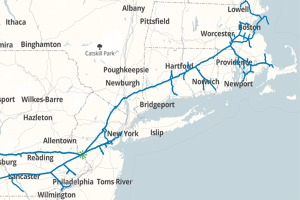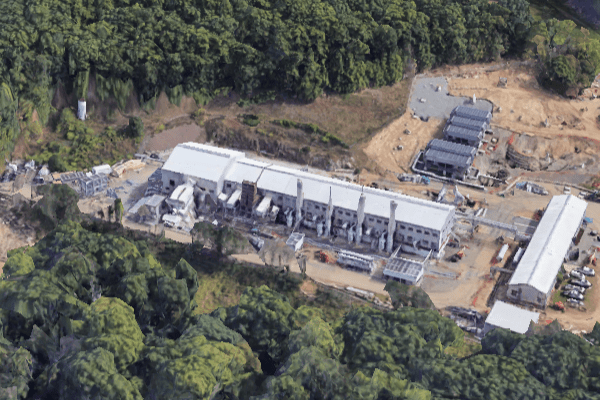|
RCBJ-Audible (Listen For Free)
|
Rockland County Legislature Passes Unanimous Resolution Urging New York State To Deny Expansion Permits
Efforts by local environmentalists, affiliated with Food and Water Watch, prompted the Rockland County Legislature to pass a resolution last week urging Governor Kathy Hochul and relevant state agencies to deny permits for the Enbridge Gas Expansion Project known as Project Maple.
The resolution was sponsored by Legislator Beth Davidson and passed unanimously.
The resolution noted that the proposed expansion would significantly increase the flow of fracked gas through compressor stations and pipeline segments traversing Rockland County, specifically through the Town of Ramapo, which is “densely populated and home to vulnerable and marginalized communities already facing environmental health disparities.”
 Project Maple, as it is called, is an effort by Enbridge, a Canadian Energy conglomerate, to expand its existing pipeline network that feeds natural gas from states that opened their lands to shale gas and fracking to New England power plants to generate electricity.
Project Maple, as it is called, is an effort by Enbridge, a Canadian Energy conglomerate, to expand its existing pipeline network that feeds natural gas from states that opened their lands to shale gas and fracking to New England power plants to generate electricity.
Across New England, about 55 percent of electric power is generated by natural gas. The balance of New England’s power comes from nuclear power plants (24 percent), and a mix of renewables (20 percent) including hydro power imported from Canada.
New England lacks its own supply of natural gas, so it is dependent on gas from production basins located outside the region.
To move the gas through the pipelines, gas compressor stations are placed about every 40 to 100 miles apart, depending on distance, elevation changes, and friction. According to Enbridge, compressor stations operate 24 hours a day, 365 days a year and are monitored 24/7. There are hundreds of compressor stations across the U.S. that play an integral role in the natural gas transmission system.
Compressor Station Video Produced By Enbridge
Here in Rockland County, Enbridge owns the Algonquin Gas Pipeline, which runs from New Jersey through Ramapo and Stony Point and then under the Hudson River. Its compressor station in Stony Point is part of the Algonquin Gas Transmission pipeline system, which has been operational since 1997. Since then, some expansions have occurred, such as the Algonquin Incremental Market (AIM) pipeline in 2017. Specifically, the AIM pipeline, which includes a compressor station near Stony Point, became operational in January 2017.
The Algonquin Gas Pipeline is Stony Point’s second largest taxpayer (New York State is the largest), paying about $16 million in town, county, and school district taxes, representing about 12 percent of Stony Point’s tax collections. In 2024-2025, Algonquin paid over $10 million in taxes to the North Rockland School District. According to the town, Algonquin’s property holding in Stony Point are valued at over $333 million.
In Ramapo, Algonquin pays about $1.75 million in property taxes, of which $1.06 million is for the local school districts.
The expansion would likely bring additional tax revenue to both towns and local schools.
According to a statement by Food & Water Watch, a Washington, D.C.-based non-governmental organization, nonprofit which focuses on corporate and government accountability relating to food, water, and corporate overreach, the “project would lock us into decades of fossil fuel dependence — just when we need to be transitioning to clean energy. It’s risky, unnecessary, and completely out of step with New York’s climate goals.”
The County’s resolution in opposition to expansion also noted issues with pipeline compressor stations that “emit pollutants linked to asthma, chronic obstructive pulmonary disease (COPD), low birthrate, and cancer.” It also said, “Project Maple would also negatively impact property values, natural open space, and tourism” and that “over 50 local and state elected officials across New York have already voiced opposition to the project.”
Current federal regulations require the compressor turbines to be designed to achieve a nitrogen oxide (NOx) emission rate of 25 ppmvd (parts per million by volume, dry basis) during normal operations. New compressor turbines are designed to achieve a NOx emission rate of 9 ppmvd during normal operations.
The Federal Energy Regulatory Commission (FERC) regulates interstate pipeline compressor stations and requires that the station’s noise levels not exceed an average day-night sound level (Ldn) of 55 decibels (dBA) at the nearest noise sensitive area, e.g., residences, schools, hospitals, churches, playgrounds and camping facilities, when operating at full load.
New York has established climate goals that contemplate 100 percent zero-emission electricity generation by 2040, and an 85 percent reduction in greenhouse gas emissions (from 1990 levels) by 2050. New York also recently passed a Climate Change Superfund Act, which authorizes the state to levy billions of dollars in fines on fossil fuel companies over the next two decades for alleged contribution to greenhouse gas (GHG) emissions. Opponents of the pipeline expansion argue that Project Maple runs counter to New York’s stated climate goals. The County resolution noted that fossil fuel infrastructure is fundamentally at odds with the goals of New York’s Climate Leadership and Community Protection Act (CLCPA) which mandates a transition away from fossil fuels in favor of renewable energy sources..
Opposition to the pipeline expansion is not limited to New York state. Municipal governments in Connecticut and Massachusetts have also passed resolutions in opposition to expansion. In addition to expressing environmental concerns, opponents also claim the conversion to renewable energy will render the pipeline obsolete and leave taxpayers on the hook to pay for unnecessary and under-utilized assets.
















